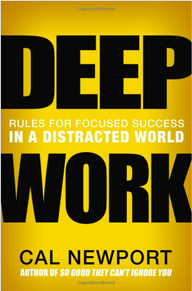53. Deep Work - Cal Newport (📱)
02 Dec 2018
Reading Notes:
Deep Work: Professional activities performed in a state of distraction-free concentration that push your cognitive capabilities to their limit. These efforts create new value, improve your skill, and are hard to replicate.
Peter Higgs, a theoretical physicist who performs his work in such disconnected isolation that journalists couldn’t find him after it was announced he had won the Nobel Prize.
Shallow Work: Noncognitively demanding, logistical-style tasks, often performed while distracted. These efforts tend to not create much new value in the world and are easy to replicate.
To remain valuable in our economy, therefore, you must master the art of quickly learning complicated things. This task requires deep work. If you don’t cultivate this ability, you’re likely to fall behind as technology advances.
I don’t touch a computer between the time when I get home from work and the next morning when the new workday begins
This ability to fully disconnect, as opposed to the more standard practice of sneaking in a few quick work e-mail checks, or giving in to frequent surveys of social media sites, allows me to be present with my wife and two sons in the evenings, and read a surprising number of books for a busy father of two.
By focusing intensely on a specific skill, you’re forcing the specific relevant circuit to fire, again and again, in isolation. This repetitive use of a specific circuit triggers cells called oligodendrocytes to begin wrapping layers of myelin around the neurons in the circuits—effectively cementing the skill. The
High-Quality Work Produced = (Time Spent) x (Intensity of Focus)
The best students understood the role intensity plays in productivity and therefore went out of their way to maximize their concentration—radically reducing the time required to prepare for tests or write papers, without diminishing the quality of their results.